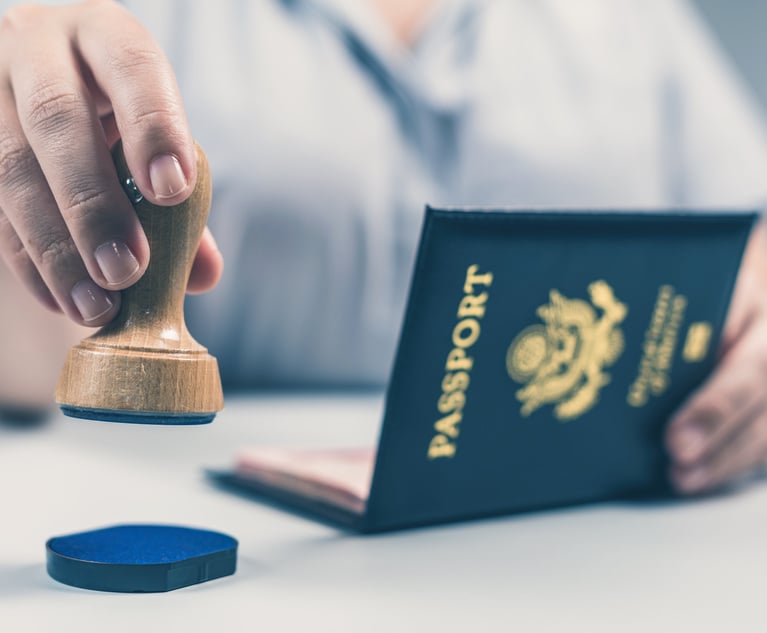FanDuel Founders' $1 Billion Suit Against Allegedly 'Conflicted' Directors Behind Merger Is Tossed
"Plaintiffs have failed to state a claim for breach of fiduciary duty" under Scottish law, which controls, "as Scots law states that directors generally owe fiduciary duties only to their company, not to its shareholders," wrote the appeals court based in Manhattan.
October 14, 2022 at 03:49 PM
7 minute read
 A sign hangs on the wall in the reception area at Fanduel Inc.'s offices in Edinburgh, U.K., on Tuesday, Feb. 7, 2017. Photo: Chris Ratcliffe/Bloomberg
A sign hangs on the wall in the reception area at Fanduel Inc.'s offices in Edinburgh, U.K., on Tuesday, Feb. 7, 2017. Photo: Chris Ratcliffe/Bloomberg
Reversing a lower court in a $1 billion lawsuit, a New York state appeals court on Thursday tossed out breach-of-fiduciary-duty claims lodged by FanDuel founders and former officers who claimed that certain "conflicted" directors undervalued the company when it merged with the bookmaker Paddy Power Betfair.
In an opinion that was tersely stated—especially when considering the complexity and stakes of the lawsuit—the Appellate Division, First Department court in Manhattan made two major rulings.
First, the court said that Scottish law, not New York law, governed the matter. And secondly, under Scottish law, the court said company directors generally owe fiduciary duties only to their corporation, not to shareholders, and, therefore, the fiduciary-duty claims of more than 130 former founders, officers, directors and employees of FanDuel must fail.
The intermediate appellate court also knocked down the plaintiffs' argument that the corporate "internal affairs doctrine," which directed which law should control, applied only to defendant directors who were at FanDuel when the billion-dollar-plus legal action was launched.
Instead, a five-justice panel ruled, the doctrine applied to all defendant directors who were at FanDuel when events transpired that gave rise to the lawsuit.
The decision from the panel was framed on Thursday by counsel to FanDuel and its board of directors as a powerful victory. In all, there were more than 15 defendants named in the lawsuit, including two private equity firms in addition to FanDuel and its directors. The more than 130 plaintiffs in the lawsuit had claimed in court arguments, according to defense counsel, and in an amended complaint that total damages could exceed $1 billion, or multiples more of that.
"This is a sweeping victory for our client which confirms that the transaction was fundamentally fair and the proceeds [from the 2018 merger] were appropriately distributed," said Mark Kirsch, a partner at King & Spalding in Manhattan who represents FanDuel and its board of directors. Matthew Biben, a fellow King & Spalding partner who has been FanDuel's longtime counsel, also helped to lead FanDuel's representation.
It appears that the plaintiffs, who have been fiercely litigating the suit since February 2020, may seek leave to appeal the First Department court's decision to New York state's highest court, the Court of Appeals, or find another route for challenging Thursday's ruling.
This content has been archived. It is available through our partners, LexisNexis® and Bloomberg Law.
To view this content, please continue to their sites.
Not a Lexis Subscriber?
Subscribe Now
Not a Bloomberg Law Subscriber?
Subscribe Now
NOT FOR REPRINT
© 2025 ALM Global, LLC, All Rights Reserved. Request academic re-use from www.copyright.com. All other uses, submit a request to [email protected]. For more information visit Asset & Logo Licensing.
You Might Like
View All
As Second Trump Administration Approaches, Businesses Brace for Sweeping Changes to Immigration Policy

Seyfarth Shaw Corporate Lawyer Authors Book on Military Transition to Civilian Life

Sullivan & Cromwell Urges Top Court to Resist Making NY the 'Shangri-La' for Derivative Shareholder Suits

Purchaser Representative in Truth Social Deal Seeks Trump Media Records
3 minute readLaw Firms Mentioned
Trending Stories
- 1Ex-Starbucks GC Exiting Latest Role, Will Get Severance
- 2Family Law Special Section 2025
- 3We Must Uphold the Rights of Immigrant Students
- 4Orrick Picks Up 13-Lawyer Tech, VC Group From Gunderson Dettmer
- 5How Alzheimer’s and Other Cognitive Diseases Affect Guardianship, POAs and Estate Planning
Who Got The Work
J. Brugh Lower of Gibbons has entered an appearance for industrial equipment supplier Devco Corporation in a pending trademark infringement lawsuit. The suit, accusing the defendant of selling knock-off Graco products, was filed Dec. 18 in New Jersey District Court by Rivkin Radler on behalf of Graco Inc. and Graco Minnesota. The case, assigned to U.S. District Judge Zahid N. Quraishi, is 3:24-cv-11294, Graco Inc. et al v. Devco Corporation.
Who Got The Work
Rebecca Maller-Stein and Kent A. Yalowitz of Arnold & Porter Kaye Scholer have entered their appearances for Hanaco Venture Capital and its executives, Lior Prosor and David Frankel, in a pending securities lawsuit. The action, filed on Dec. 24 in New York Southern District Court by Zell, Aron & Co. on behalf of Goldeneye Advisors, accuses the defendants of negligently and fraudulently managing the plaintiff's $1 million investment. The case, assigned to U.S. District Judge Vernon S. Broderick, is 1:24-cv-09918, Goldeneye Advisors, LLC v. Hanaco Venture Capital, Ltd. et al.
Who Got The Work
Attorneys from A&O Shearman has stepped in as defense counsel for Toronto-Dominion Bank and other defendants in a pending securities class action. The suit, filed Dec. 11 in New York Southern District Court by Bleichmar Fonti & Auld, accuses the defendants of concealing the bank's 'pervasive' deficiencies in regards to its compliance with the Bank Secrecy Act and the quality of its anti-money laundering controls. The case, assigned to U.S. District Judge Arun Subramanian, is 1:24-cv-09445, Gonzalez v. The Toronto-Dominion Bank et al.
Who Got The Work
Crown Castle International, a Pennsylvania company providing shared communications infrastructure, has turned to Luke D. Wolf of Gordon Rees Scully Mansukhani to fend off a pending breach-of-contract lawsuit. The court action, filed Nov. 25 in Michigan Eastern District Court by Hooper Hathaway PC on behalf of The Town Residences LLC, accuses Crown Castle of failing to transfer approximately $30,000 in utility payments from T-Mobile in breach of a roof-top lease and assignment agreement. The case, assigned to U.S. District Judge Susan K. Declercq, is 2:24-cv-13131, The Town Residences LLC v. T-Mobile US, Inc. et al.
Who Got The Work
Wilfred P. Coronato and Daniel M. Schwartz of McCarter & English have stepped in as defense counsel to Electrolux Home Products Inc. in a pending product liability lawsuit. The court action, filed Nov. 26 in New York Eastern District Court by Poulos Lopiccolo PC and Nagel Rice LLP on behalf of David Stern, alleges that the defendant's refrigerators’ drawers and shelving repeatedly break and fall apart within months after purchase. The case, assigned to U.S. District Judge Joan M. Azrack, is 2:24-cv-08204, Stern v. Electrolux Home Products, Inc.
Featured Firms
Law Offices of Gary Martin Hays & Associates, P.C.
(470) 294-1674
Law Offices of Mark E. Salomone
(857) 444-6468
Smith & Hassler
(713) 739-1250






